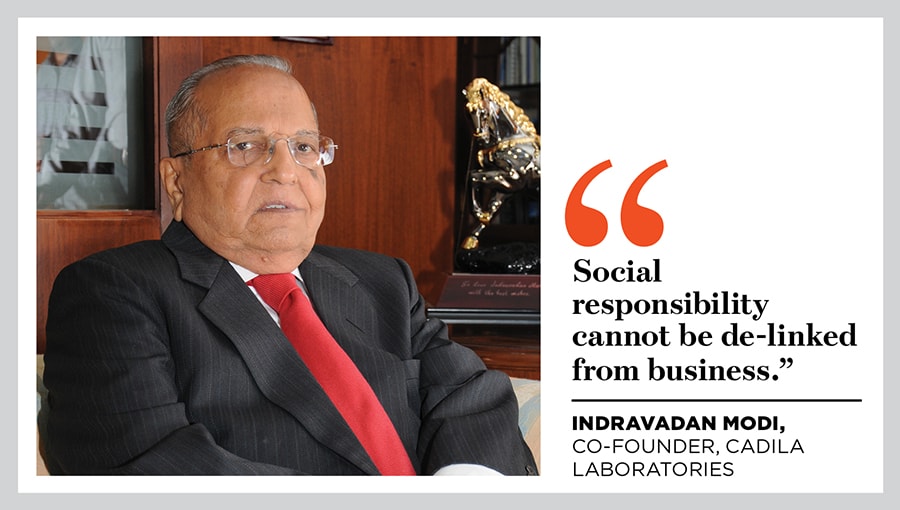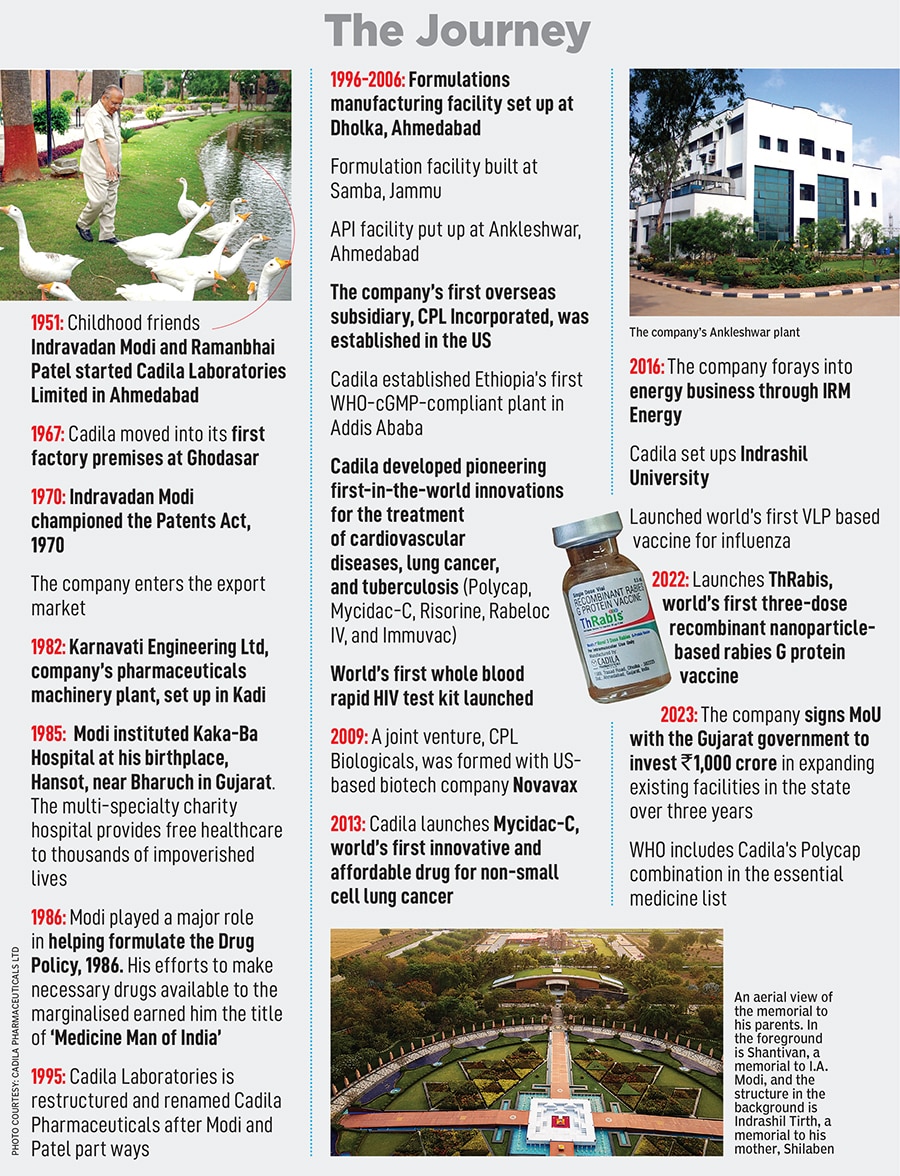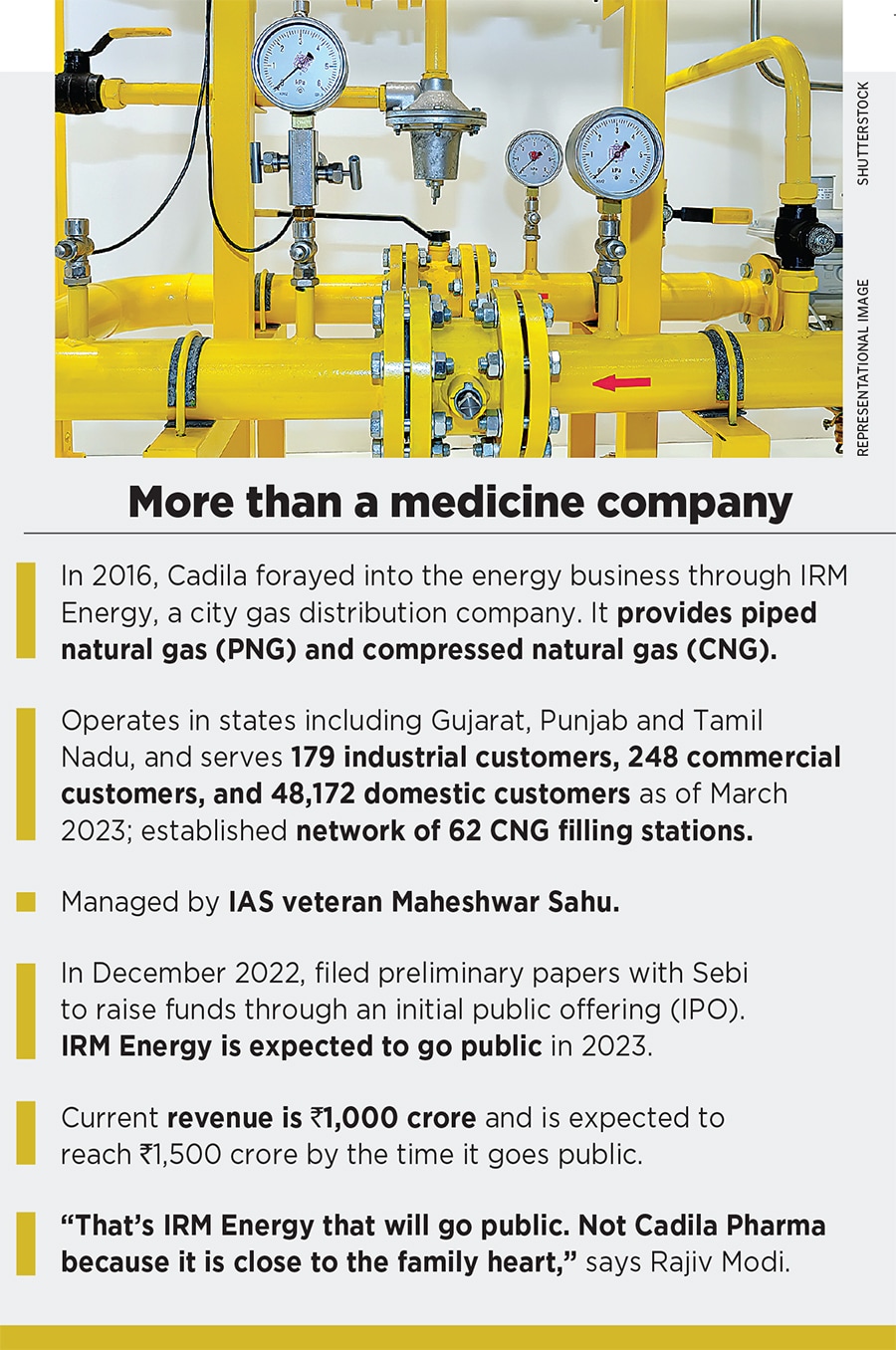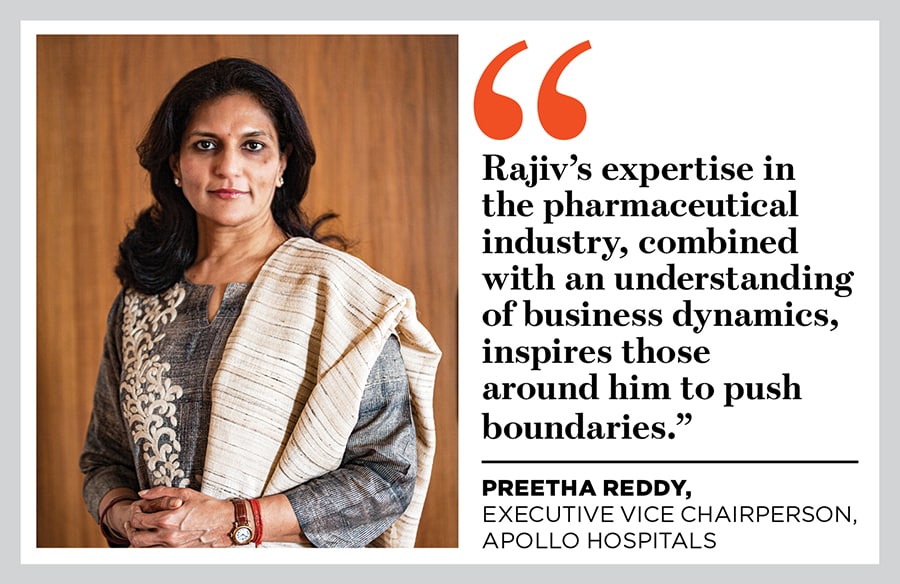Dressed in a simple white shirt, Modi walks us through the other side of the Dholka plant. There is a Sanatan Dharma Temple Tirth complex, a work-in-progress of 85 temple replicas from all over India that he is building to celebrate his late mother, Shilaben Modi. Twenty nine miniatures are ready, including Varanasi’s Kashi Vishwanath temple, Hampi’s Vittala temple and Udaipur’s Eklingji temple.
Shilaben was believed to be pious and religious. She was also the third employee of Cadila Laboratories and played a key role in manufacturing Cadila Gripe, one of the first indigenously produced gripe water in India.
On the other side is Shantivan, which commemorates 87 years of his late father with 87 obelisks, 87 shlokas of the Bhagwad Gita, 87 herbal and spiritual plant species, and pathways to his cremation point with imprinted milestones tracing 87 years of his life. Passionate about spiritualism, Indravadan was a believer in the philosophies of the Vedas and the Puranas, among other scriptures, and to memorialise this his son organises a Shrimad Bhagwat Gita Katha and Ashtavakra Gita Katha every year.
This is the spiritual and societal aspect that Modi tried to put in place in memory of his parents. But the spirit of the company and the family lies in making economical medicines for people. Affordable and accessible medicines are the core philosophy of the family, Modi says. “We have innovation that is not cheap. First-in-the-world is definitely not cheap. But we ensure our pricing is affordable," he says.
![]()
Some 30 km from Dholka is the Cadila corporate office, where one of the corner rooms, belonging to the patriarch who died in 2012, has been left as it is since that day. A business magazine from that year still sits on the coffee table, and the book shelf is adorned with books as diverse as Mother Teresa’s The Joy in Loving and Thomas L Friedman’s The World is Flat.
Adjacent to Indravadan’s office is a smaller one that the current chairman and managing director occupies. He isn’t in (we met him earlier in the day in Dholka). On the board behind his desk are two lines of two words each, which perhaps sum up Rajiv Modi’s focus areas: ‘Doubling productivity’ and ‘affordable miracles’.
Hailing from the village of Hansot in Bharuch district of south Gujarat, as a young student studying in Mumbai, Indravadan sacrificed a scholarship in food technology to pursue his passion in pharmaceuticals. During the formative years of the business, the 25-year-old founder delivered medicines on his bicycle.
![]()
One of the company’s first products, Livirubra, was a liquid vitamin supplement. The amended Indian Patents Act, 1970, championed by Indravadan, was a turning point for India’s generics industry. This led to many Indian pharma companies manufacturing medicines at one-tenth the price of other countries. Indravadan was clear about making drugs affordable and accessible. In his words, “True celebration of research lies as much in inventions as in making medicine affordable to the last man in society."
Cadila Labs earned its spurs for beginning with liquid preparations like Cadila Gripe and Livirubra in the 1950s and ’60s. This was followed by two products, Isopar, for the treatment of tuberculosis, and Neuroxin-12 injection for vitamin B1, B6 and B12 made compatible in a vial for the first time. This earned him the moniker ‘Medicine Man of India’. He also played a role in helping formulate the Government of India’s Drug Policy, 1986.
In 1995, Indravadan and Ramanbhai Patel decided to part ways and formed two new entities after dissolution. Cadila Pharmaceuticals Limited is owned by the Modi family, while Cadila Healthcare Limited, now renamed as Zydus Lifesciences Limited, is managed by the Patel family.
In 1991, Modi joined the company’s board. He has a doctorate in biological sciences from the University of Michigan and has inherited his father’s penchant for innovation. His company has to its credit pioneering innovations like Polycap, a combination drug for preventing cardiovascular diseases that recently made it to the World Health Organization’s (WHO) list of essential medicines almost a decade after it was launched, and Mycidac-C to treat non-small cell lung cancer, to name just two.
“There is no other company in the world that has a three-dose rabies vaccine. There was no other company until one year ago that had a recombinant non-egg based flu vaccine. It’s not only simple molecules, we are talking about high and biological vaccines," says Modi, referring to Cadila Pharmaceutical’s ThRabis, the world’s first three-dose recombinant nano-particle-based rabies G protein vaccine that was launched in 2022. “And we have six-seven other novel vaccines in the pipeline. In the next five-seven years we’ll bring out all these vaccines."
But where does Modi stand on growth? It’s here that he differs from typical entrepreneurs. He is passionate about innovation, spirituality, about serving the underprivileged by building hospitals and educational infrastructure. And about allied businesses like tissue culture, herbals and pharma equipment. He will pump in whatever he earns into these endeavours, but growth for growth’s sake is not his mantra. Which is why he has chosen to stay private, well aware that a public listing may well have helped him grow faster.
“I’m pretty much clear that Cadila is not going public. Our bottom line has not been the greatest, but we put money back. And give back to my parents they started the company to do good [to others]. For me, that’s really relevant. I hope my son also carries that."
Last year, the company’s revenue stood at Rs 3,000 crore and the overall group revenue including other businesses, is over Rs 4,000 crore. “We should be a Rs 10,000- 20,000 crore company with what we have. We’re now focusing more on building market share," says the 63-year-old entrepreneur. “But if you go to any market and speak to any prescriber, we have a very high reputation. But pharma marketing has evolved in our country. So we need to catch up," he adds.
![]()
He concedes that now is the time to grow and consolidate. “Cadila will be a much larger corporation by the time I hand over to my successor. It’s going to be at least 10 times more. We are on that path now. So we need to grow. And we will grow, gain market share, because we have a wonderful legacy. We have done wonderful things, we just need to focus now on market share. We have to become more relevant to today’s world," says Modi.
Cadila Pharma ranks 24th in the pharma market in India and has a value market share of around 0.7 percent. It has shown a robust five-year compound annual growth rate (CAGR) of approximately 9 percent, explains Sheetal Sapale, vice president-commercial, Pharmarack Technologies Ltd.
“The company has been traditionally a strong player in the gastro segment with legacy brand Aciloc, which has a wide acceptance in the category. While the gastro therapy for the company continues to grow stronger, we also see some other therapies like gynaecological, nutritionals, and some other therapies gradually becoming stronger for the company in the recent months."
Rajiv’s “unwavering commitment" to innovation has always been inspiring, says Preetha Reddy, executive vice chairperson, Apollo Hospitals. “Moreover, his deep-rooted expertise in the pharmaceutical industry, combined with a profound understanding of business dynamics, inspires those around him to push boundaries. Working with him has been an embodiment of shared goals, mutual respect, and a collective pursuit of advancements." In 2006, Cadila entered a joint venture with Apollo Hospitals Group to manage Apollo Hospitals, Ahmedabad.
![]()
Succession Planning
After the
Forbes India interaction, Modi’s next appointment was fixed with his son, also named Rajiv. Junior Rajiv, who is studying abroad in college, has not joined the business yet. But the father is confident that he will. The duo share a very close bond. “He works round the clock," Rajiv tells us.
The son is fond of travelling by trains. Currently on a voyage of self-discovery, he works on voluntary assignments and seeks his father’s views when needed. “Why are you investing so much in factories? In 10 years with artificial intelligence there will be no factories," he tells his father. Rajiv laughs. Asked how he would react if his son decides to take the company public, he says, “The day he takes over, he is free to chart his own course."
How Cadila Pharma evolves in future will depend on how legacy values and a rapidly-changing world come together, and how old makes way for the new. The challenge may well be in knowing what to keep and what to discard.




